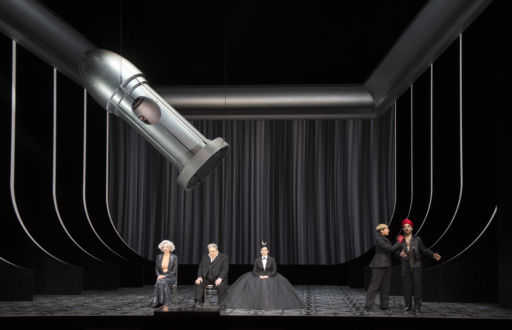Deutsche Staatsoper Berlin, season 2017/2018
“SALOME”
Drama in one act, text after the drama “Salomé” by Oscar Wilde translated by Hedwig Lachmann.
Music by Richard Strauss
Herodes, Tetrarch of Judaea and Perea GERHARD SIEGEL
Herodias, his wife MARINA PRUDENSKAYA
Salome, his stepdaughter AUSRINE STUNDYTE
Jochanaan THOMAS J. MAYER
Narraboth, Captain of the Guard NIKOLAI SCHUKOFF
The Page of Herodias ANNIKA SCHLICHT
First Jew DIETMAR KERSCHBAUM
Second Jew MICHAEL SMALLWOOD
Third Jew LINARD VRIELINK
Forth Jew ANDRÉS MORENO GARCÍA
Fifth Jew DAVID OSTREK
First Nazarene ADAM KUTNY
Second Nazarene ULF DIRK MÄDLER
First soldier ARTTU KATAJA
Second soldier DOMINIC BARBERI
A Cappadocian DAVID OSTREK
A slave CORINNA SCHEUERLE
Oscar Wilde CHRISTIAN NATTER
Staatskapelle Berlin
Conductor Thomas Guggeis
Production Hans Neuenfels
Stage and costumes Reinhard von der Tannen
Choreography Sommer Ulrickson
Light Gleb Filshtinsky
Berlin, 10th March 2018
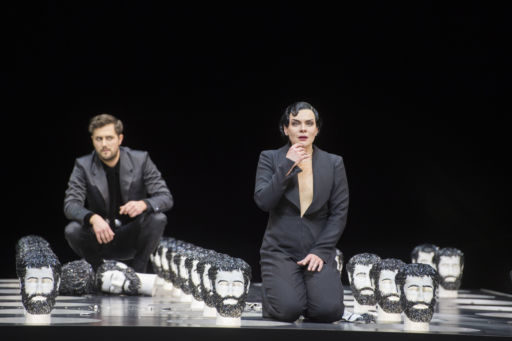 The one-act operas by Richard Strauss are much more condensed but not at all less thrilling than the other Richard’s long music dramas. The new production of Salome by Hans Neuenfels at the Deutsche Staatsoper Berlin is actually coherent. I admit there are no really new aspects in it but is there anything we have not seen on the operatic stage yet since the 1960s when directors started the Regietheater in Germany. Neuenfels concentrates on the characters and their interactions so that the opera with the second largest orchestra (only Elektra requires more instruments) nearly turns into an intimate play. The stage designed by Reinhard von der Tannen can be associated by its black and white geometric lines with the aesthetics of Fritz Lang’s silent film Metropolis or show theatre decorations from the roaring twenties. Herodes, Herodias and Salome are sitting on chairs when the curtain rises. Jochanaan is visible in a phallus-like steel rocket which hangs aslope from the ceiling. Later the soldiers lower it so that Jochanaan can leave it for the big scene with Salome who has taken off her black tulle dress (costumes also by Reinhard von der Tannen) after lifting it voluptuously to make Narraboth obey her. I wonder if the tulle is supposed to remind us of the veils in Salome’s dance which is of course performed differently in this production. Jochanaan wears a kind of black dress while Salome has turned into a business woman in a trouser suit. Neuenfels is carrying sexual identity so far that Oscar Wilde appears announced by red neon writing: “Wilde is coming” to act as Salome’s alter ego in a suit with displayed silver testicles. She gives him her crescent crown that he puts on along with a skull mask and leather harness for the Dance of the seven veils. Salome brings him down at the end of it and pretends to bite pieces of flesh out of him. For the final scene he is presenting her a few dozens of identical heads of Jochanaan rolled in on a big platform so that Salome can play with them, nibble at them and smash a few. Altogether
The one-act operas by Richard Strauss are much more condensed but not at all less thrilling than the other Richard’s long music dramas. The new production of Salome by Hans Neuenfels at the Deutsche Staatsoper Berlin is actually coherent. I admit there are no really new aspects in it but is there anything we have not seen on the operatic stage yet since the 1960s when directors started the Regietheater in Germany. Neuenfels concentrates on the characters and their interactions so that the opera with the second largest orchestra (only Elektra requires more instruments) nearly turns into an intimate play. The stage designed by Reinhard von der Tannen can be associated by its black and white geometric lines with the aesthetics of Fritz Lang’s silent film Metropolis or show theatre decorations from the roaring twenties. Herodes, Herodias and Salome are sitting on chairs when the curtain rises. Jochanaan is visible in a phallus-like steel rocket which hangs aslope from the ceiling. Later the soldiers lower it so that Jochanaan can leave it for the big scene with Salome who has taken off her black tulle dress (costumes also by Reinhard von der Tannen) after lifting it voluptuously to make Narraboth obey her. I wonder if the tulle is supposed to remind us of the veils in Salome’s dance which is of course performed differently in this production. Jochanaan wears a kind of black dress while Salome has turned into a business woman in a trouser suit. Neuenfels is carrying sexual identity so far that Oscar Wilde appears announced by red neon writing: “Wilde is coming” to act as Salome’s alter ego in a suit with displayed silver testicles. She gives him her crescent crown that he puts on along with a skull mask and leather harness for the Dance of the seven veils. Salome brings him down at the end of it and pretends to bite pieces of flesh out of him. For the final scene he is presenting her a few dozens of identical heads of Jochanaan rolled in on a big platform so that Salome can play with them, nibble at them and smash a few. Altogether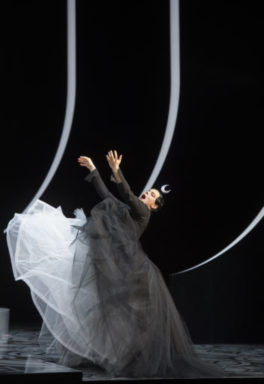 it turns out a thrilling and condensed opera night as intended by the composer, also thanks to the very young conductor Thomas Guggeis. As the assistant to Daniel Barenboim he was to conduct only the last of the first run of performances but Christoph von Dohnányi packed in his job before the dress rehearsal, supposedly out of disagreement with the director’s approach. Guggeis does a very good job turning the score into a vibrating sound at a firm and appropriate tempo without the Staatskapelle Berlin covering the singers. Ausrine Stundyte in the title role may not have an ideal Strauss soprano but her singing intensity is awesome and largely makes up for the fact that her voice is neither big nor does it sound charming. Jochanaan is sung by Thomas J. Mayer in a mostly stentorian way, which goes with both the static character of the prophet and the director’s conception. Gerhard Siegel as Herodes sings top notes with aplomb and uses compelling pianissimi when telling his stepdaughter about his hidden jewels. He proves that he is not a tenor at the end but on the crest of his career. Marina Pudenskaya is a very elegant Herodias with a warm and plush mezzo-soprano which is able to sing really all notes of the part including a fantastic “heiß ihn schweigen!”. There is no doubt that Nikolai Schukoff is on the way to become a Heldentenor. His Narraboth sounds attractive and powerful and the singer enhances the part. The same with Annika Schlicht’s page who sings adequate warnings of gloom and doom. The five Jews are excellently cast with Dietmar Kerschbaum, Michael Smallwood, Linard Vrielink, Andrés Moreno García and David Ostrek while Adam Kutny as first Nazarene sticks out of the other minor parts. The actor Christian Natter is also worth mentioning in the silent role of Oscar Wilde.
it turns out a thrilling and condensed opera night as intended by the composer, also thanks to the very young conductor Thomas Guggeis. As the assistant to Daniel Barenboim he was to conduct only the last of the first run of performances but Christoph von Dohnányi packed in his job before the dress rehearsal, supposedly out of disagreement with the director’s approach. Guggeis does a very good job turning the score into a vibrating sound at a firm and appropriate tempo without the Staatskapelle Berlin covering the singers. Ausrine Stundyte in the title role may not have an ideal Strauss soprano but her singing intensity is awesome and largely makes up for the fact that her voice is neither big nor does it sound charming. Jochanaan is sung by Thomas J. Mayer in a mostly stentorian way, which goes with both the static character of the prophet and the director’s conception. Gerhard Siegel as Herodes sings top notes with aplomb and uses compelling pianissimi when telling his stepdaughter about his hidden jewels. He proves that he is not a tenor at the end but on the crest of his career. Marina Pudenskaya is a very elegant Herodias with a warm and plush mezzo-soprano which is able to sing really all notes of the part including a fantastic “heiß ihn schweigen!”. There is no doubt that Nikolai Schukoff is on the way to become a Heldentenor. His Narraboth sounds attractive and powerful and the singer enhances the part. The same with Annika Schlicht’s page who sings adequate warnings of gloom and doom. The five Jews are excellently cast with Dietmar Kerschbaum, Michael Smallwood, Linard Vrielink, Andrés Moreno García and David Ostrek while Adam Kutny as first Nazarene sticks out of the other minor parts. The actor Christian Natter is also worth mentioning in the silent role of Oscar Wilde.
Die Operneinakter von Richard Strauss sind viel dichter, aber überhaupt nicht weniger aufregend als die langen Musikdramen des anderen Richard. Die Neuinszenierung von Salome von Hans Neuenfels an der Deutschen Staatsoper Berlin ist eigentlich in sich stimmig. Zugegebenermaßen gibt es keine wirklich neuen Aspekte darin, aber gibt es etwas auf der Opernbühne noch nicht Dagewesenes seit den 1960ern, als Regisseure in Deutschland mit dem Regietheater anfingen? Neuenfels konzentriert sich auf die Protagonisten und ihre Interaktionen, so dass die Oper mit dem zweitgrößten Orchester (nur Elektra erfordert mehr Instrumente) fast zum Kammerspiel gerät. Das von Reinhard von der Tannen entworfene Bühnenbild erinnert durch seine schwarz-weißen 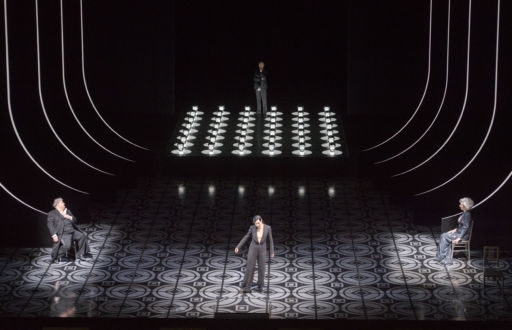 geometrischen Linien irgendwie an die Ästhetik von Fritz Langs Stummfilm Metropolis oder Revuetheaterausstattungen aus den goldenen Zwanzigern. Der Vorhang hebt sich und Herodes, Herodias und Salome sitzen auf Stühlen. Jochanaan ist sichtbar in einer phallusähnlichen Stahlrakete, die schräg von der Decke hängt. Später lassen die Soldaten sie herunter, so dass Jochanaan sie verlassen kann für die große Szene mit Salome, die ihr schwarzes Tüllkleid (Kostüme auch von Reinhard von der Tannen) ausgezogen hat, ohne es zuvor lüstern zu lüften, um Narraboth dazu zu bringen, ihr zu gehorchen. Ich weiß nicht, ob die Tülle uns an die Schleier in Salomes Tanz erinnern soll, der natürlich in dieser Inszenierung anders ausfällt. Jochanaan trägt eine Art schwarzes Kleid während Salome zu einer Businessfrau im Hosenanzug mutiert. Neuenfels treibt sexuelle Identität so weit, dass er Oscar Wilde auftreten lässt, der mit roter Leuchtschrift „Wilde is coming” angekündigt wird, und als Salomes alter ego agiert, in einem Anzug mit sichtbaren Silberhoden. Sie gibt ihm ihre Halbmondkrone, die er zusammen mit einer Totenkopfmaske und einem Lederharness für den Tanz der sieben Schleier trägt. Salome ringt ihn am Ende zu Boden und gibt vor, Fleischteile aus ihm herauszubeißen. Für die Schlußszene präsentiert er ihr einige Dutzend gleicher Johanaan-Köpfe, die auf einem großen Podest hereingerollt werden und mit denen Salome spielen, sie anknabbern und einige zerschlagen kann. Insgesamt kommt ein aufregender verdichteter Opernabend heraus wie vom Komponisten beabsichtigt, auch dank des sehr jungen Dirigenten Thomas Guggeis. Als Assistant von Daniel Barenboim sollte er nur die letzte der ersten Aufführungen dirigieren, aber Christoph von Dohnányi schmiss vor der
geometrischen Linien irgendwie an die Ästhetik von Fritz Langs Stummfilm Metropolis oder Revuetheaterausstattungen aus den goldenen Zwanzigern. Der Vorhang hebt sich und Herodes, Herodias und Salome sitzen auf Stühlen. Jochanaan ist sichtbar in einer phallusähnlichen Stahlrakete, die schräg von der Decke hängt. Später lassen die Soldaten sie herunter, so dass Jochanaan sie verlassen kann für die große Szene mit Salome, die ihr schwarzes Tüllkleid (Kostüme auch von Reinhard von der Tannen) ausgezogen hat, ohne es zuvor lüstern zu lüften, um Narraboth dazu zu bringen, ihr zu gehorchen. Ich weiß nicht, ob die Tülle uns an die Schleier in Salomes Tanz erinnern soll, der natürlich in dieser Inszenierung anders ausfällt. Jochanaan trägt eine Art schwarzes Kleid während Salome zu einer Businessfrau im Hosenanzug mutiert. Neuenfels treibt sexuelle Identität so weit, dass er Oscar Wilde auftreten lässt, der mit roter Leuchtschrift „Wilde is coming” angekündigt wird, und als Salomes alter ego agiert, in einem Anzug mit sichtbaren Silberhoden. Sie gibt ihm ihre Halbmondkrone, die er zusammen mit einer Totenkopfmaske und einem Lederharness für den Tanz der sieben Schleier trägt. Salome ringt ihn am Ende zu Boden und gibt vor, Fleischteile aus ihm herauszubeißen. Für die Schlußszene präsentiert er ihr einige Dutzend gleicher Johanaan-Köpfe, die auf einem großen Podest hereingerollt werden und mit denen Salome spielen, sie anknabbern und einige zerschlagen kann. Insgesamt kommt ein aufregender verdichteter Opernabend heraus wie vom Komponisten beabsichtigt, auch dank des sehr jungen Dirigenten Thomas Guggeis. Als Assistant von Daniel Barenboim sollte er nur die letzte der ersten Aufführungen dirigieren, aber Christoph von Dohnányi schmiss vor der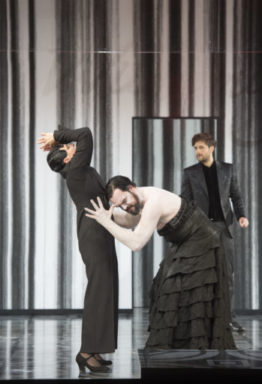 Generalprobe hin, dem Vernehmen nach wegen Differenzen mit dem Regiekonzept. Guggeis macht seine Sache sehr gut und setzt die Partitur mit flirrendem Klang um bei zügigem und angemessenem Tempo, ohne dass die Staatskapelle Berlin die Sänger zudeckt. Ausrine Stundyte in der Titelrolle mag keinen idealen Strauss-Sopran besitzen, aber die Intensität ihres Gesangs ist beeindruckend und macht weitestgehend wett, dass ihre Stimme weder groß ist noch wohltönend klingt. Jochanaan wird von Thomas J. Mayer größtenteils stentormäßig gesungen, was sowohl zur statischen Figur des Propheten als auch zur Konzeption des Regisseurs passt. Gerhard Siegel als Herodes singt großartige Spitzentöne und bedient sich bezwingender Pianissimi, wenn er seiner Stieftochter von den versteckten Juwelen erzählt, womit er beweist, dass er kein Tenor am Ende sondern auf dem Zenit seiner Karriere ist. Marina Pudenskaya ist eine sehr elegante Herodias mit einem warmen üppigen Mezzosopran, der in der Lage ist, wirklich alle Töne der Partie zu singen, einschließlich eines tollen „heiß ihn schweigen!”. Zweifellos ist Nikolai Schukoff auf dem Weg zum Heldentenor. Sein Narraboth klingt ansprechend und kraftvoll und der Sänger wertet die Partie auf. Gleiches gilt für Annika Schlichts Pagen: sie singt angemessene düstere Warnungen. Das Judenquintett ist ausgezeichnet besetzt mit Dietmar Kerschbaum, Michael Smallwood, Linard Vrielink, Andrés Moreno García und David Ostrek, während Adam Kutny als erster Nazarener aus den anderen Nebenrollen heraussticht. Auch der Schauspieler Christian Natter in der stummen Rolle des Oscar Wilde sei erwähnt. Photo Monika Rittershaus
Generalprobe hin, dem Vernehmen nach wegen Differenzen mit dem Regiekonzept. Guggeis macht seine Sache sehr gut und setzt die Partitur mit flirrendem Klang um bei zügigem und angemessenem Tempo, ohne dass die Staatskapelle Berlin die Sänger zudeckt. Ausrine Stundyte in der Titelrolle mag keinen idealen Strauss-Sopran besitzen, aber die Intensität ihres Gesangs ist beeindruckend und macht weitestgehend wett, dass ihre Stimme weder groß ist noch wohltönend klingt. Jochanaan wird von Thomas J. Mayer größtenteils stentormäßig gesungen, was sowohl zur statischen Figur des Propheten als auch zur Konzeption des Regisseurs passt. Gerhard Siegel als Herodes singt großartige Spitzentöne und bedient sich bezwingender Pianissimi, wenn er seiner Stieftochter von den versteckten Juwelen erzählt, womit er beweist, dass er kein Tenor am Ende sondern auf dem Zenit seiner Karriere ist. Marina Pudenskaya ist eine sehr elegante Herodias mit einem warmen üppigen Mezzosopran, der in der Lage ist, wirklich alle Töne der Partie zu singen, einschließlich eines tollen „heiß ihn schweigen!”. Zweifellos ist Nikolai Schukoff auf dem Weg zum Heldentenor. Sein Narraboth klingt ansprechend und kraftvoll und der Sänger wertet die Partie auf. Gleiches gilt für Annika Schlichts Pagen: sie singt angemessene düstere Warnungen. Das Judenquintett ist ausgezeichnet besetzt mit Dietmar Kerschbaum, Michael Smallwood, Linard Vrielink, Andrés Moreno García und David Ostrek, während Adam Kutny als erster Nazarener aus den anderen Nebenrollen heraussticht. Auch der Schauspieler Christian Natter in der stummen Rolle des Oscar Wilde sei erwähnt. Photo Monika Rittershaus
